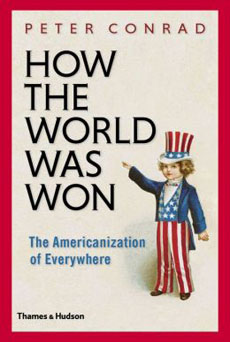Peter Conrad is an Australian writer and author of an eclectic group of 20 books including Imagining America. He has taught English Literature at Christ Church, Oxford for many years. Since 1980, he has divided his time between London and the United States. Like an ambitious and accomplished pole vaulter, he sets the bar very high and then in one focused jump clears it. Could that just have been luck? He runs and jumps skyward again and clears the bar even more than before.
In this bold work of literary and cultural criticism, Conrad proves himself up to the daunting task of showing the ways America won the world over, mostly with its music and movies.
In 1941, Henry Luce published an editorial in Life where he said that America should take over human affairs. After the Japanese attack on Pearl Harbor, the United States came out of its isolation and started to wield its power and influence on the world stage. Even a critic as smart as Edmund Wilson on a reconnaissance trip to Europe found himself wishing that these countries could be more like America.
Although the Americanization process was well underway, French writer Simone de Beauvoir while on tour lamented the fact that so few people in this large and energetic country had any sense of the capacity for evil in human beings. Visitors to American shores experience disorientation and Conrad gives the reason why: "Travelling to America, you are projected into the future. Returning to Europe, you live backwards, drowning in time not outpacing it."
American movies were so popular in Europe that French directors such as Francois Truffaut, Louis Malle, and Jacques Demy tried to mimic their stories and style. Conrad does a fine job explaining the cult of James Dean which contributed to what Jean-Paul Godard called "the Americanization of French life." He also covers the impact of American movies on Japan.
Losing the war in Vietnam revealed to the world the nation's vulnerability. But this was balanced by the movies about those dreaming to be admitted to America: Moscow on the Hudson, Maria Full of Grace, The Visitor, Amreeka, and others. Conrad ends his exuberant tour with the thought:
"America won the world by winning it over, sometimes with candy bars and jeans, mostly with images and sounds… At the start of what was meant to be its own century, America took pride in being the world's savior. After that, it accepted an obligation to be the world's protector. Today it is probably best described as the world's designated entertainer."
